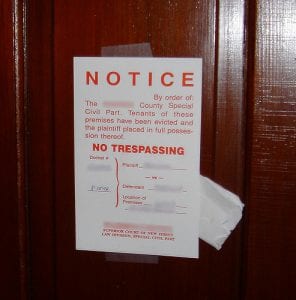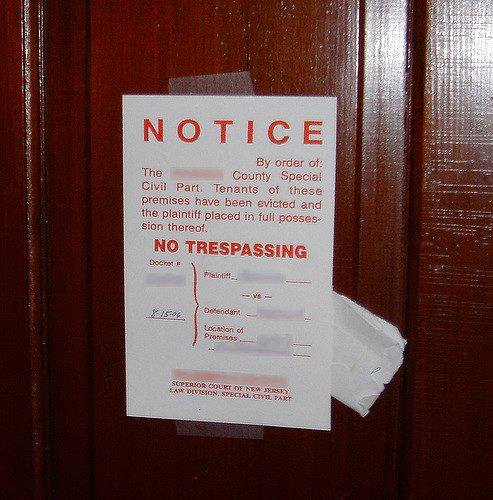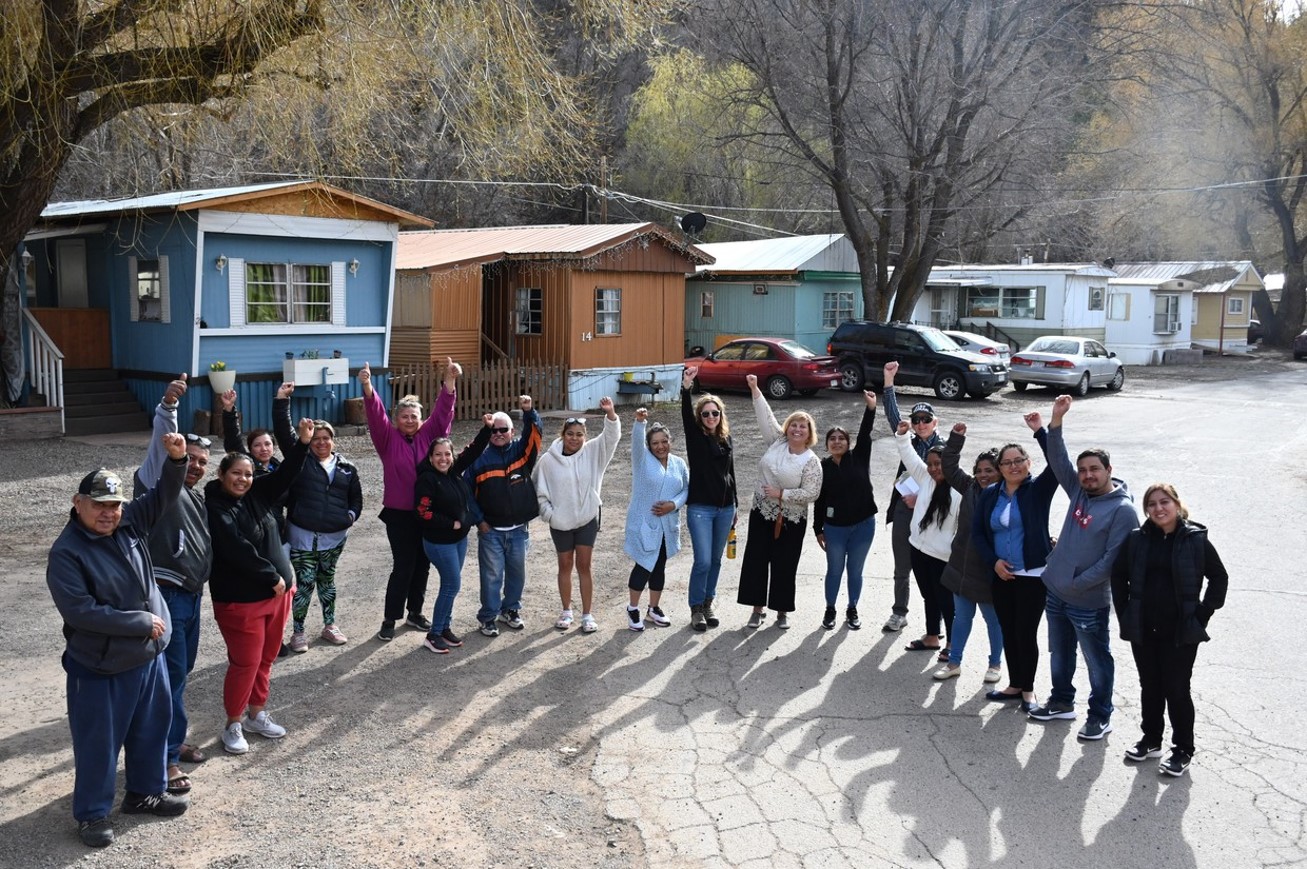
Photo by rickonine via flickr, CC BY-NC 2.0
In November, at 11 p.m. on a Tuesday, a woman in her early 30s walked into our emergency room in East Boston, with her 6-year-old and 2-year-old children in tow. She had gotten home from work that evening to find her front door taped over with caution tape and didn’t know where to go. She came to our ER and my colleagues scrambled for an answer. They called social workers at the Boston Medical Center (BMC) ER, who said they see a few cases like this each week. Eventually the emergency room doctor footed the bill for a cheap, local hotel that night.
On another evening in December, the nurse handed me an EKG for the patient in room 7, a 15-year-old girl who had palpitations and nausea. I walked in to find a young woman, her hands gripping the edge of the exam table. Her father was seated in a chair by the door with a worried look on his face. She explained that when she entered her home this afternoon, there was an overwhelming chemical smell, and there were workers inside painting the apartment. She was afraid. No one had told them or asked their permission to send a painting crew into the house that day. She felt nauseated from the smell and her heart was racing. Her younger sister was in another exam room.
Her father explained that week after week their landlady had been asking them to move out. “We pay our rent every month, on time, but it’s hard to save enough money to put together first, last, and security to move into a new apartment.” He explained that the landlady was trying to evict them so she could sell the whole building. “I’m happy to let them do renovations, but why are they trying to evict us?”
—Lara Jirmanus, M.D., MPH, attending physician, Emergency Department, East Boston Neighborhood Health Center, and fellow, FXB Center for Health and Human Rights, Harvard School of Public Health, testimony to the Boston City Council support of the Jim Brooks Community Stabilization Act.
Housing crises are health crises. Toxic mold causes asthma. Lack of heat weakens immune systems. Unaffordability causes stress. Forced choices between paying the rent and paying for medical care or food lead to poor health.
Around the country, health care institutions that recognize this have started to employ lawyers onsite to help patients fight landlords for better housing conditions or qualify for housing subsidies (plus a range of other legal supports that will generally have direct effect on their health).
But lawyers can only go as far as the law goes.
“What’s [the] point of legal defense against someone who just wants you out, if [everything they are doing] is legal?” observes Steve Meacham, an organizer with City Life/Vida Urbana in Boston.
And in many places tenants have few legal protections, especially ones that might stem waves of eviction and displacement that are showing up in hot markets like Boston and the Bay Area.
Landlords in most parts of the country don’t have to have cause to initiate an eviction (or to refuse to renew a lease, though the most vulnerable tenants are often without a lease). Tenants in all kinds of markets are also often, ironically, left without a home if their substandard housing is condemned for code violations, as was powerfully documented in the Pulitzer–prize winning book, Evicted.
The Health Arguments for Just Cause Eviction
Could the next frontier of cooperation between health care professionals and housing advocates be tenant rights organizing?
In Boston, physician Lara Jirmanus’s powerful testimony in support of the Jim Brooks Stabilization Act, which also appeared on WBUR, suggests that it might.
Jirmanus’s experiences as a doctor are backed up by a rapid health impact assessment (RHIA), conducted by graduate planning students working under Professor Mariana Arcaya of MIT, in support of the act. The RHIA reviews potential health consequences of both the reduced incidence of eviction and also the reduced anticipation of eviction that having a just cause measure on the books would generate. It covers everything from direct health impacts of eviction, to the health effects of frequent moves, to the increased risks of homelessness and loss of social capital, and connection to place and their health effects. Overall, it makes a pretty compelling case that mass eviction is a public health nightmare.
And a wave of eviction is what Boston is facing. “Speculators in East Boston are buying and clearing out buidings, especially smaller buildings,” says Meacham. “The local eviction crisis is tantamount to a child health and public health crisis,” writes Jirmanus.
Meacham, like Jirmanus, sees the physical and mental health effects of mass evictions in the people he organizes with every day. He doesn’t necessarily think that bringing in health as another argument in support of more protections will change the minds of policymakers. “The whole battle around displacement and eviction . . . doesn’t have a lot to do with logic and argument,” he says. He notes that city council members have been supportive while they campaign, but once elected, the influence of the real estate industry overpowers all.
But Meacham does think that talking about the health angle is important for building a movement to fight back against building clear-outs. “The goal is for people to react to building clear-outs and massive rent hikes with resistance, not acquiescence,” he says. “There should be accountability for what that causes on the part of the rapacious investors.”
The Jim Brooks Stabilization act is currently being supported by the mayor, but needs to pass both the city council and the state legislature. It would require a cause for every eviction (causes could include nonpayment of rent, damaging the apartment, or using it for illegal purposes, for example), require foreclosing entities to let former homeowners stay if they pay “reasonable rent,” and require landlords to file a copy of any “notice to quit” with the city with enough time for the city to inform tenants of their rights.
This last bit, says Meacham, might have the greatest effect, since a landlord determined to remove a tenant still has the option of raising the rent dramatically and then waiting for it not to be paid. However, with notice delivered to the city, tenants can be made aware both of their legal rights and some resources for fighting back collectively. City Life/Vida Urbana helps out tenants with their Sword and Shield strategy, which combines legal representation and public pressure and demonstrations. “A [large landlord’s] reputation is affected by our protests, and their business model is affected if it takes a year instead of a month to get people out,” says Meacham, so knowing where evictions are happening can make a big difference.
Just Cause Passes in San Jose
On the other side of the country, on April 18, San Jose’s city council passed a Just Cause Eviction ordinance after a long, hard-fought campaign that included a hunger strike. Just Cause eviction protections have been a goal of organizers there for decades, noted organizer Bob Brownstein.
Supporters of the ordinance in San Jose also featured the health effects in their campaign material, even referencing Boston’s health impact assessment. Tenants testified at the city council meeting about being evicted for reporting mold or requesting working appliances.
San Jose’s ordinance also requires landlords to provide relocation assistance for tenants if their apartment is taken off the market for repairs or through conversion to ownership units. And the just cause eviction requirement will provide especially strong protection to tenants in San Jose’s rent controlled units, who can’t be hit with rent hikes intended to force them out.
Beyond Just Cause
Meanwhile in New York, Attorney General Eric Schneiderman is proposing a bill that will make it easier to charge landlords who are trying to harass rent-stabilized tenants into leaving (a rampant problem in New York City and something Jared Kushner has been accused of overseeing). Maybe he should pull in the health sector as well? After all, “The new legislation would allow charges against landlords who launch dust-spewing construction projects in hopes of forcing residents out, or cut off heat and hot water.” Those kinds of things seem likely to cause health problems even before you get to stress and housing instability.
It would be exciting and meaningful to see more parts of the health sector translate their concern about the cumulative effects on health of eviction and housing instability into active support for increased tenant protections like these. (Perhaps then the next just cause ordinance to pass wouldn’t require a hunger strike—additional health bonus).






Comments